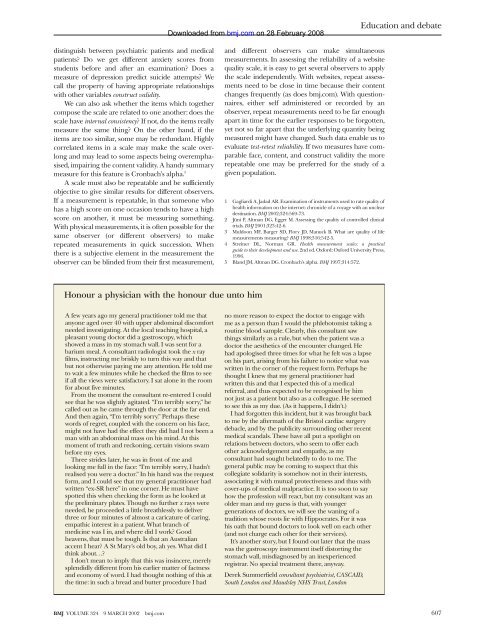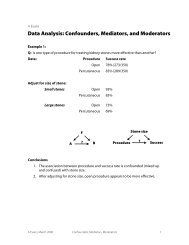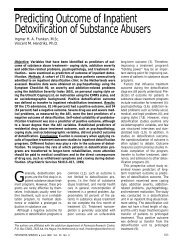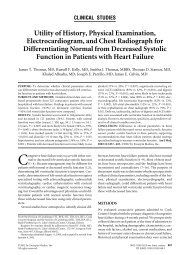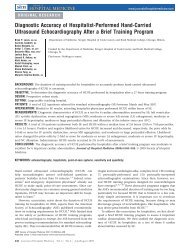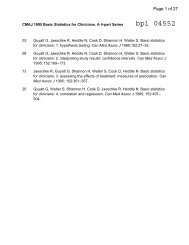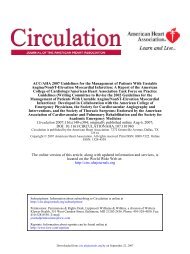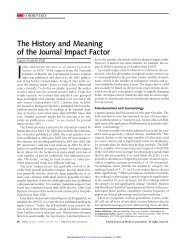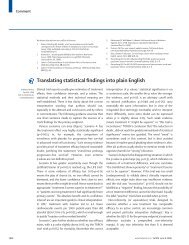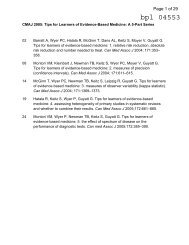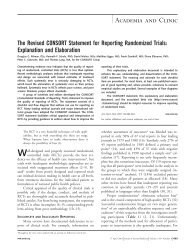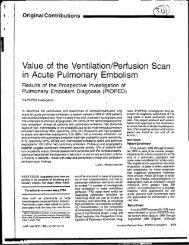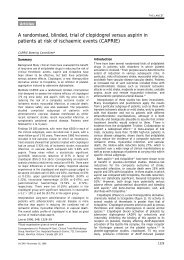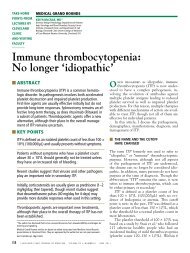BMJ Statistical Notes Series List by JM Bland: http://www-users.york ...
BMJ Statistical Notes Series List by JM Bland: http://www-users.york ...
BMJ Statistical Notes Series List by JM Bland: http://www-users.york ...
You also want an ePaper? Increase the reach of your titles
YUMPU automatically turns print PDFs into web optimized ePapers that Google loves.
distinguish between psychiatric patients and medical<br />
patients? Do we get different anxiety scores from<br />
students before and after an examination? Does a<br />
measure of depression predict suicide attempts? We<br />
call the property of having appropriate relationships<br />
with other variables construct validity.<br />
We can also ask whether the items which together<br />
compose the scale are related to one another: does the<br />
scale have internal consistency? If not, do the items really<br />
measure the same thing? On the other hand, if the<br />
items are too similar, some may be redundant. Highly<br />
correlated items in a scale may make the scale overlong<br />
and may lead to some aspects being overemphasised,<br />
impairing the content validity. A handy summary<br />
measure for this feature is Cronbach’s alpha. 5<br />
A scale must also be repeatable and be sufficiently<br />
objective to give similar results for different observers.<br />
If a measurement is repeatable, in that someone who<br />
has a high score on one occasion tends to have a high<br />
score on another, it must be measuring something.<br />
With physical measurements, it is often possible for the<br />
same observer (or different observers) to make<br />
repeated measurements in quick succession. When<br />
there is a subjective element in the measurement the<br />
observer can be blinded from their first measurement,<br />
Honour a physician with the honour due unto him<br />
A few years ago my general practitioner told me that<br />
anyone aged over 40 with upper abdominal discomfort<br />
needed investigating. At the local teaching hospital, a<br />
pleasant young doctor did a gastroscopy, which<br />
showed a mass in my stomach wall. I was sent for a<br />
barium meal. A consultant radiologist took the x ray<br />
films, instructing me briskly to turn this way and that<br />
but not otherwise paying me any attention. He told me<br />
to wait a few minutes while he checked the films to see<br />
if all the views were satisfactory. I sat alone in the room<br />
for about five minutes.<br />
From the moment the consultant re-entered I could<br />
see that he was slightly agitated. “I’m terribly sorry,” he<br />
called out as he came through the door at the far end.<br />
And then again, “I’m terribly sorry.” Perhaps these<br />
words of regret, coupled with the concern on his face,<br />
might not have had the effect they did had I not been a<br />
man with an abdominal mass on his mind. At this<br />
moment of truth and reckoning, certain visions swam<br />
before my eyes.<br />
Three strides later, he was in front of me and<br />
looking me full in the face: “I’m terribly sorry, I hadn’t<br />
realised you were a doctor.” In his hand was the request<br />
form, and I could see that my general practitioner had<br />
written “ex-SR here” in one corner. He must have<br />
spotted this when checking the form as he looked at<br />
the preliminary plates. Though no further x rays were<br />
needed, he proceeded a little breathlessly to deliver<br />
three or four minutes of almost a caricature of caring,<br />
empathic interest in a patient. What branch of<br />
medicine was I in, and where did I work? Good<br />
heavens, that must be tough. Is that an Australian<br />
accent I hear? A St Mary’s old boy, ah yes. What did I<br />
think about. . .?<br />
I don’t mean to imply that this was insincere, merely<br />
splendidly different from his earlier matter of factness<br />
and economy of word. I had thought nothing of this at<br />
the time: in such a bread and butter procedure I had<br />
<strong>BMJ</strong> VOLUME 324 9 MARCH 2002 bmj.com<br />
Downloaded from<br />
bmj.com on 28 February 2008<br />
and different observers can make simultaneous<br />
measurements. In assessing the reliability of a website<br />
quality scale, it is easy to get several observers to apply<br />
the scale independently. With websites, repeat assessments<br />
need to be close in time because their content<br />
changes frequently (as does bmj.com). With questionnaires,<br />
either self administered or recorded <strong>by</strong> an<br />
observer, repeat measurements need to be far enough<br />
apart in time for the earlier responses to be forgotten,<br />
yet not so far apart that the underlying quantity being<br />
measured might have changed. Such data enable us to<br />
evaluate test-retest reliability. If two measures have comparable<br />
face, content, and construct validity the more<br />
repeatable one may be preferred for the study of a<br />
given population.<br />
1 Gagliardi A, Jadad AR. Examination of instruments used to rate quality of<br />
health information on the internet: chronicle of a voyage with an unclear<br />
destination. <strong>BMJ</strong> 2002;324:569-73.<br />
2 Jüni P, Altman DG, Egger M. Assessing the quality of controlled clinical<br />
trials. <strong>BMJ</strong> 2001;323:42-6.<br />
3 Muldoon MF, Barger SD, Flory JD, Manuck B. What are quality of life<br />
measurements measuring? <strong>BMJ</strong> 1998;316:542-5.<br />
4 Streiner DL, Norman GR. Health measurement scales: a practical<br />
guide to their development and use. 2nd ed. Oxford: Oxford University Press,<br />
1996.<br />
5 <strong>Bland</strong> <strong>JM</strong>, Altman DG. Cronbach’s alpha. <strong>BMJ</strong> 1997;314:572.<br />
no more reason to expect the doctor to engage with<br />
me as a person than I would the phlebotomist taking a<br />
routine blood sample. Clearly, this consultant saw<br />
things similarly as a rule, but when the patient was a<br />
doctor the aesthetics of the encounter changed. He<br />
had apologised three times for what he felt was a lapse<br />
on his part, arising from his failure to notice what was<br />
written in the corner of the request form. Perhaps he<br />
thought I knew that my general practitioner had<br />
written this and that I expected this of a medical<br />
referral, and thus expected to be recognised <strong>by</strong> him<br />
not just as a patient but also as a colleague. He seemed<br />
to see this as my due. (As it happens, I didn’t.)<br />
I had forgotten this incident, but it was brought back<br />
to me <strong>by</strong> the aftermath of the Bristol cardiac surgery<br />
debacle, and <strong>by</strong> the publicity surrounding other recent<br />
medical scandals. These have all put a spotlight on<br />
relations between doctors, who seem to offer each<br />
other acknowledgement and empathy, as my<br />
consultant had sought belatedly to do to me. The<br />
general public may be coming to suspect that this<br />
collegiate solidarity is somehow not in their interests,<br />
associating it with mutual protectiveness and thus with<br />
cover-ups of medical malpractice. It is too soon to say<br />
how the profession will react, but my consultant was an<br />
older man and my guess is that, with younger<br />
generations of doctors, we will see the waning of a<br />
tradition whose roots lie with Hippocrates. For it was<br />
his oath that bound doctors to look well on each other<br />
(and not charge each other for their services).<br />
It’s another story, but I found out later that the mass<br />
was the gastroscopy instrument itself distorting the<br />
stomach wall, misdiagnosed <strong>by</strong> an inexperienced<br />
registrar. No special treatment there, anyway.<br />
Derek Summerfield consultant psychiatrist, CASCAID,<br />
South London and Maudsley NHS Trust, London<br />
Education and debate<br />
607


